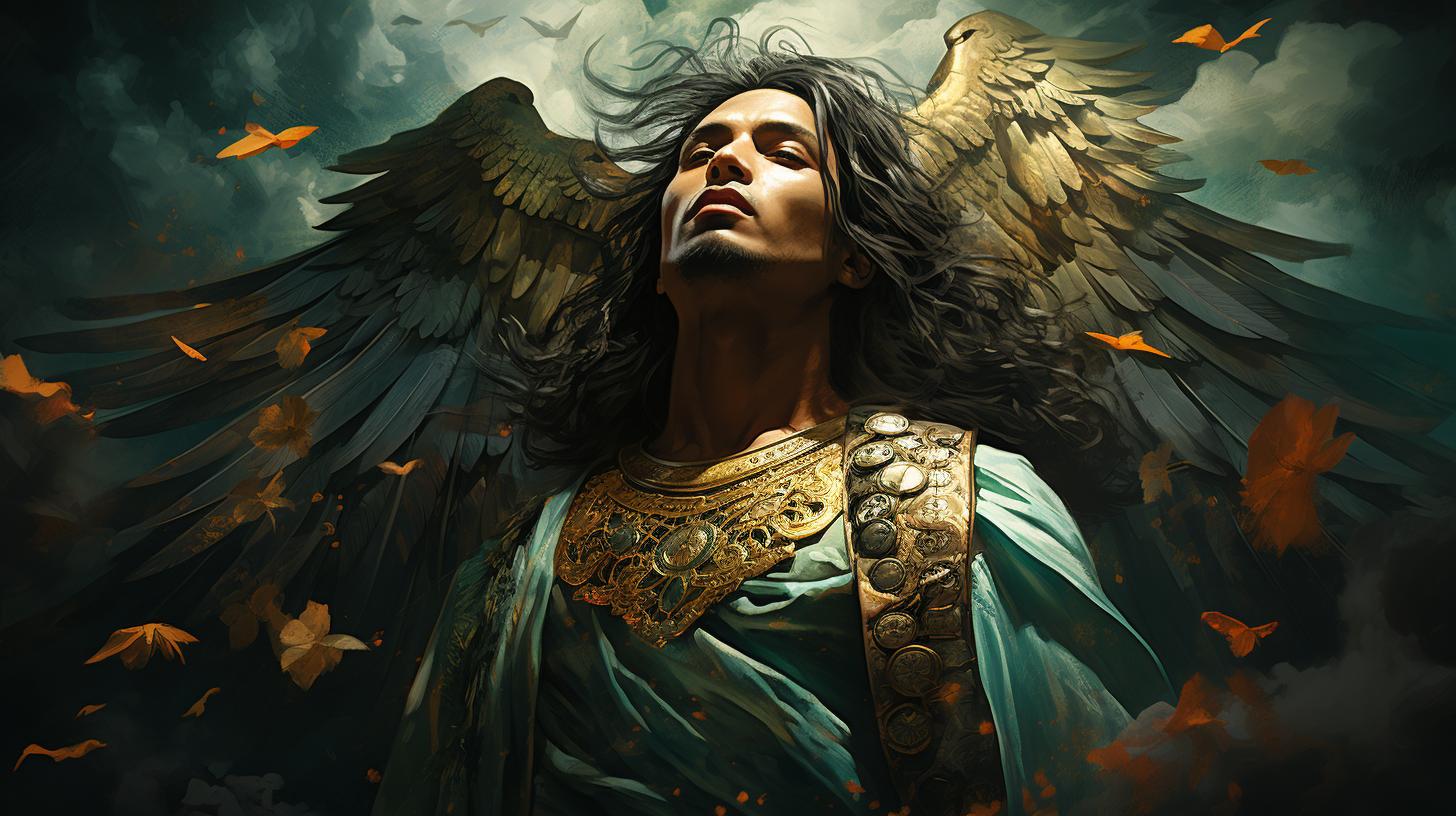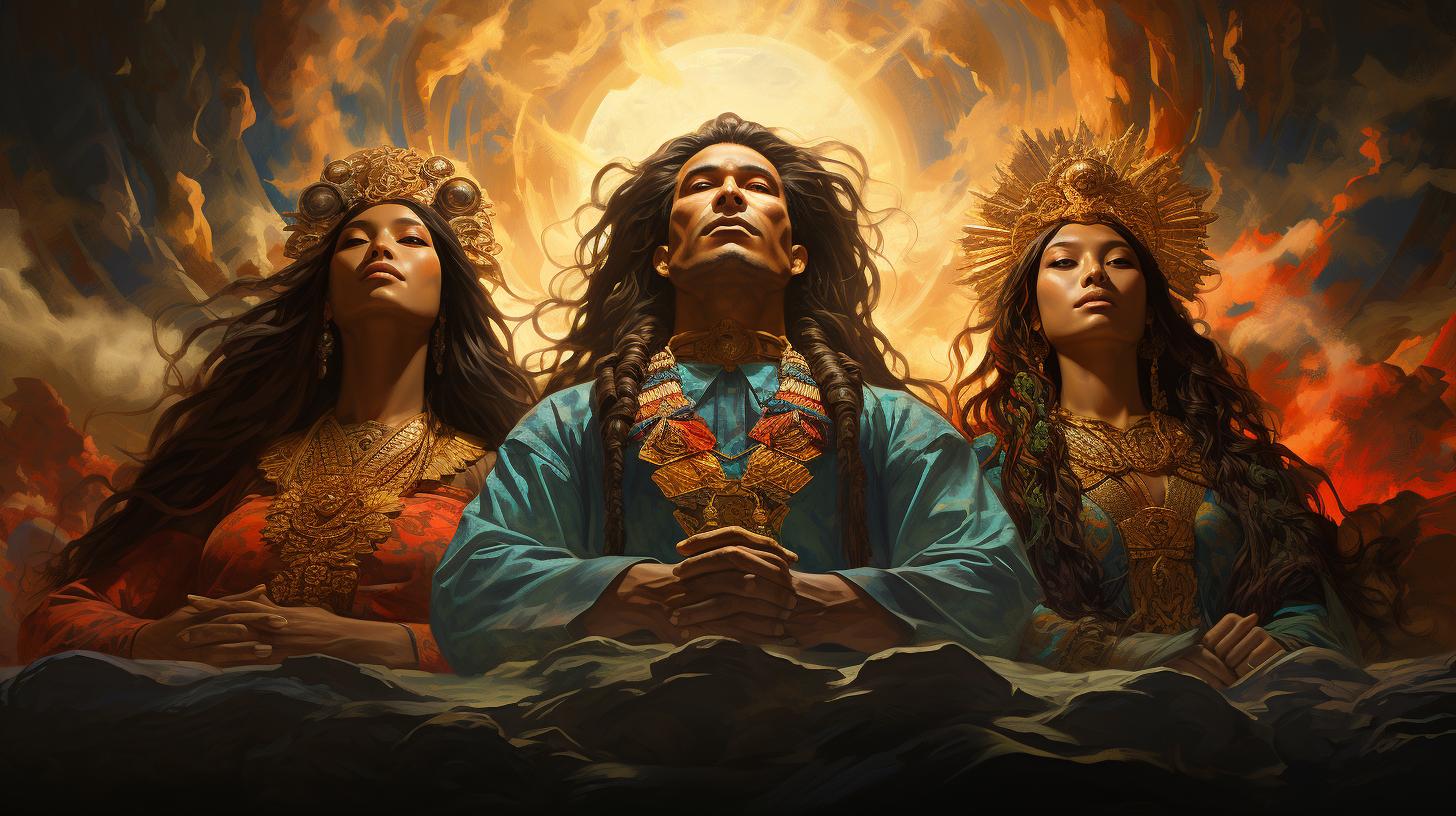Mapulon: The Captivating God of Seasons in Filipino Mythology

Mapulon, the captivating God of Seasons in Filipino Mythology, holds a special place in the pantheon of Tagalog deities. Revered for his roles in health, the changing seasons, and courtship, Mapulon’s beauty and connection to nature make him one of the most beloved gods in the mythology.
This article explores the origins of Mapulon, his significance in agricultural cycles, and rituals dedicated to him. Additionally, it delves into the relationship between Mapulon and Lakapati, another important deity, and the festivals that honor their legacies in the Philippines today.
Mapulon: Exploring the God of Seasons in Filipino Mythology
Welcome to the fascinating world of Mapulon, the God of Seasons in Filipino Mythology. In this section, we will delve into the origins and role of Mapulon in the rich tapestry of Philippine mythology, as well as the connection between Mapulon and the changing seasons, and his influence on health and nature.
The Origins and Role of Mapulon in Philippine Mythology
In the mythology of the Philippines, Mapulon holds a special place as the God of Seasons. He is revered for his various roles, including his association with health, agricultural cycles, and courtship.
As the son of Bathala, the supreme god, and Idianale, the goddess of agriculture, Mapulon represents the inseparable bond between the gods and the earth.
The Connection Between Mapulon and the Seasons
Mapulon’s divine dominion over the changing seasons is of great significance in Philippine culture.
He holds the key to understanding the fluctuations of time and the agricultural cycles that sustain the livelihoods of the Filipino people. Represented as a young figure adorned with vibrant colors of nature, Mapulon wields a bundle of golden grains, symbolizing his power over bountiful harvests and agricultural abundance.
Mapulon’s Influence on Health and Nature
Beyond his association with the seasons, Mapulon plays a crucial role in promoting health and harmony in nature. His benevolent influence extends to the well-being of both people and the natural world.
It is believed that invoking Mapulon’s favor can ensure favorable climatic conditions for cultivation. Filipino farmers engage in rituals, prayers, dances, and offerings to seek his blessings before embarking on the planting season.
Through examining the origins and role of Mapulon, understanding his connection to the seasons, and recognizing his profound influence on health and nature, one can gain a deeper appreciation for his significance within Filipino mythology and the cultural heritage of the Philippines.
Lakapati: The Goddess Associated with Mapulon
Lakapati, a significant deity in Philippine Mythology, is closely associated with Mapulon, the God of Seasons. Together, they represent the harmonious relationship between health, agriculture, and the changing seasons.
Lakapati, often depicted as a female goddess, holds a crucial role in the agricultural practices of ancient Filipinos.
The Relationship Between Mapulon and Lakapati
Mapulon, the God of Seasons, and Lakapati have a deep connection as husband and wife in the Filipino pantheon. Lakapati, the Goddess of Agriculture, is not only Mapulon’s partner but also a prominent deity in her own right.
Their union symbolizes the inseparable link between the well-being of the Filipino people and the cultivation of the land.
Exploring Lakapati’s Importance in Philippine Mythology
Lakapati’s significance extends beyond her association with Mapulon. She is revered as the deity of fertility, abundance, and prosperity. Ancient Filipinos sought her blessings to ensure bountiful harvests and agricultural success.
Her image is often depicted with symbols of abundance, such as ripe fruits and grains, exemplifying her role in sustaining the agricultural livelihood of the Filipino community.
Furthermore, Lakapati holds a cherished place in the hearts of Filipino farmers, who rely on her intercession for favorable weather conditions and abundant crops. Her role in promoting agricultural prosperity has made her a revered figure in the rural farming communities of the Philippines.
In modern Filipino culture, Lakapati’s significance is celebrated through various festivals and rituals. These cultural events pay homage to her and acknowledge her vital role in the cycle of life, seasons, and agricultural abundance.
Overall, Lakapati’s association with Mapulon and her importance in Philippine mythology make her a revered and influential goddess. Her role as the deity of agriculture and fertility resonates with the Filipino people, highlighting the intrinsic connection between nature, fertility, and the well-being of the community.
Mapulon Festivals and Rituals: Celebrating the God of Seasons
An Overview of Mapulon Festivals in the Philippines
The Philippines is rich in vibrant festivals dedicated to celebrating the God of Seasons, Mapulon. These festivals, such as the Festival of Mapulon or Pista ni Mapulon, hold a significant place in the hearts of rural agricultural communities across the country.
They are characterized by colorful processions, traditional dances, and abundant offerings of fruits and vegetables.
Rituals and Offerings to Invoke Mapulon’s Favor
To invoke Mapulon’s favor and ensure favorable climate conditions for bountiful crops, Filipino farmers engage in various rituals. Before the planting season begins, they recite prayers, perform dances, and offer sacrifices as a way to connect with Mapulon.
These rituals aim to show gratitude for previous harvests and seek blessings for future harvests.
- Reciting prayers invoking Mapulon’s blessings
- Performing traditional dances dedicated to Mapulon
- Offering sacrifices of animals or agricultural produce
- Decorating altars or shrines with vibrant flowers and grains
The Significance of Mapulon Festivals in Modern Filipino Culture
The festivals dedicated to Mapulon have endured throughout generations, serving as a testament to the deep-rooted connection between the Filipino people, their agricultural heritage, and the divine.
These celebrations not only honor Mapulon but also provide an opportunity for communities to come together, express gratitude for fruitful harvests, and reinforce their cultural identity.
The significance of Mapulon festivals extends beyond their religious and cultural aspects.
They also contribute to local tourism, attracting visitors from within the country and abroad. These festivals showcase the unique traditions, dances, music, and delectable cuisine of each region, creating a vibrant tapestry of Filipino culture.
As the years go by, it is essential to preserve the legacy of Mapulon and continue celebrating the God of Seasons. Through these festivals and rituals, future generations can stay connected to their ancestral roots, ensuring that the rich mythology and cultural heritage of the Philippines remain alive and vibrant in the modern world.
The Symbolism of Mapulon: God of Seasons and Agriculture
Mapulon, the God of Seasons in Filipino Mythology, holds immense significance in the agricultural practices of ancient Filipinos. His role in agricultural cycles and the abundance of harvests established him as a paramount figure in their lives.
Mapulon’s Significance in the Agricultural Practices of Ancient Filipinos
In the agricultural practices of ancient Filipinos, Mapulon played a crucial role in ensuring favorable weather conditions for cultivation. Farmers revered him and sought his favor to bless their crops with abundant growth and protect them from natural disasters.
Agricultural rituals were performed to invoke Mapulon’s blessings. These rituals involved offerings, such as grains and fruits, to express gratitude and seek his benevolence. Farmers believed that their devotion and prayers would ensure fruitful harvests and sustenance for their communities.
Mapulon’s importance extended beyond the cultivation of crops. He was also associated with the overall prosperity of the land, ensuring the well-being and abundance of resources for the communities. His domain over the seasons symbolized the cyclical nature of life and the interconnectedness of human existence with the natural world.
The Symbolic Representation of Mapulon in Art and Literature
The symbolism of Mapulon is vividly depicted in various forms of art and literature in Filipino culture. Paintings, sculptures, and literary works portray him as a youthful figure adorned with vibrant colors, representing the ever-changing seasons.
Mapulon is often depicted holding a bundle of golden grains, symbolizing his dominion over agricultural cycles and bountiful harvests. This imagery serves as a reminder of the vital connection between Mapulon, the seasons, and the sustenance of the Filipino people.
Furthermore, artistic representations of Mapulon emphasize his beauty and connection with nature. Through these depictions, artists aim to capture the profound impact of Mapulon’s influence on the lives of ancient Filipinos and their reverence for the cycles of the seasons.
Mapulon’s symbolic representation in art and literature also serves as a means of preserving Filipino heritage and culture. It allows future generations to connect with their ancestral beliefs and appreciate the deep-rooted connection between the Filipino people and the natural world.
- Mapulon’s significance in ancient agricultural practices:
- Role in ensuring favorable weather conditions
- Devotion and rituals performed to seek his blessings
- Association with overall prosperity of the land
- The symbolic representation of Mapulon in art and literature:
- Vivid depiction of youthful figure adorned with vibrant colors
- Symbolism of holding a bundle of golden grains
- Emphasis on beauty and connection with nature
Mapulon’s significance in ancient agricultural practices and his symbolic representation in art and literature reveal the profound influence he had on the lives of ancient Filipinos.
The preservation of his symbolism ensures that the legacy of Mapulon as the God of Seasons and Agriculture continues to resonate in the modern world.
Mapulon’s Influence on Filipino Society and Culture
Mapulon’s Role in the Lives of Ancient Filipinos
In ancient Filipino society, Mapulon held a significant role in the lives of the people.
As the God of Seasons, he was believed to have direct control over the agricultural cycles, ensuring bountiful harvests and prosperity for the community. The ancient Filipinos relied on Mapulon’s favor to provide favorable weather conditions for cultivation, and they performed rituals and offered sacrifices to invoke his blessings.
Mapulon’s influence extended beyond agriculture, as he was also associated with health and well-being. The people sought his guidance and protection, turning to him in times of sickness or adversity.
The Continued Reverence for Mapulon in Modern Filipino Society
Even in modern Filipino society, the reverence for Mapulon has not waned.
His role as the God of Seasons has remained deeply ingrained in the culture and traditions of the Filipino people. Today, farmers continue to seek his favor and blessings for successful harvests, performing rituals and offering prayers to ensure favorable climatic conditions for their crops.
Mapulon is celebrated and honored in festivals held throughout the Philippines, in both rural agricultural communities and urban areas. These festivities involve colorful processions, traditional dances, and the presentation of offerings as a symbol of gratitude for the abundant harvests.
Furthermore, Mapulon’s significance goes beyond the agricultural realm. As an important figure in Filipino mythology, he represents the connection between the divine and earthly realms, highlighting the interdependence between humans and nature.
Mapulon’s influence on Filipino society and culture is a testament to the enduring belief in the power of divine intervention and the deep respect for the natural world. With his captivating beauty and benevolence, Mapulon continues to inspire and evoke a sense of awe among the Filipino people, reminding them of their ancestral heritage and deep-rooted connection to the land.
In conclusion, Mapulon’s influence on Filipino society and culture is multifaceted. In ancient times, he played a vital role in agriculture and health, guiding the lives of the people. Today, his revered status persists, with farmers seeking his favor and celebrations held in his honor.
Mapulon’s legacy serves as a reminder of the profound link between humans and nature, emphasizing the importance of harmonious coexistence and the timeless traditions passed down through generations. The reverence for Mapulon in modern Filipino society highlights the enduring cultural and spiritual significance associated with the God of Seasons.
Exploring the Legends and Stories about Mapulon
Embark on a journey through the rich tapestry of legends and stories that surround Mapulon, the captivating God of Seasons in Filipino mythology.
Within Philippine mythology, numerous myths and tales have been passed down through generations, each showcasing the prowess and influence of Mapulon.
These stories often depict him as a divine figure who wields power over the changing seasons and agricultural cycles. One such famous myth tells the tale of Mapulon’s encounter with a mischievous forest spirit, challenging his ability to maintain harmony and balance in the natural world.
Delve deeper into the intriguing stories that unveil Mapulon’s adventures and divine exploits. Discover how he overcomes various trials and tribulations, demonstrating his ability to bring abundance and fertility to the land.
These tales explore Mapulon’s interactions with other deities, such as Lakapati, and how their union reinforces the symbiotic relationship between health, agriculture, and the changing seasons.
By understanding Mapulon's relevance, we can also incorporate his teachings into contemporary practices, such as sustainable farming, environmental stewardship, and promoting a deeper connection to nature.This helps us forge a more balanced and harmonious relationship with the natural world, contributing to the preservation of both our cultural heritage and the planet.
In conclusion, preserving Mapulon's stories and understanding his relevance in the modern world is crucial for safeguarding Filipino mythology and heritage.By keeping these tales alive, we honor our ancestral traditions and gain valuable insights into sustainable practices and our connection to the divine. Let us continue to explore and embrace the legacy of Mapulon, ensuring its enduring presence and appreciation in Filipino culture.
.



















